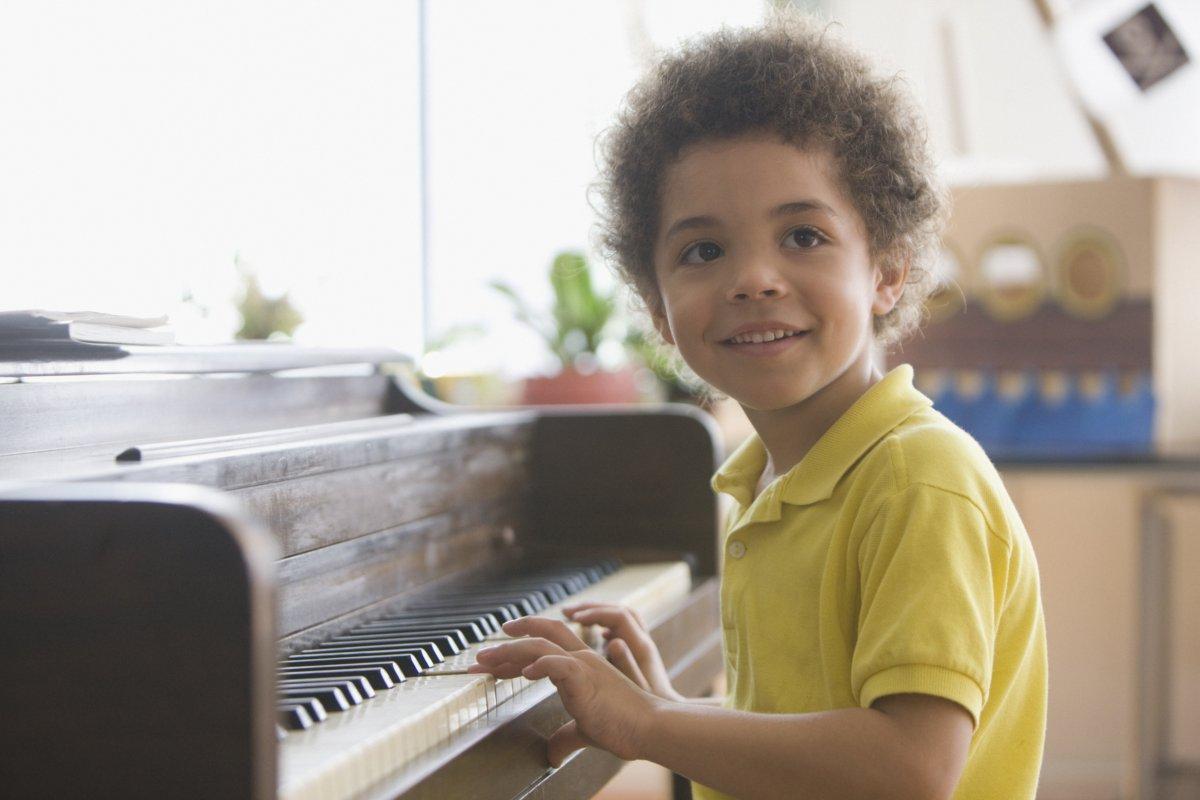If you’re considering taking piano lessons but can’t decide when the right time is, don’t worry! You don’t need a time machine to figure it out.
Here are some tips for finding the right time to start studying the piano.
What is the Best Age to Start Piano Lessons?
When is a good age to start piano lessons? The short answer is…it depends. Knowing when to start taking piano lessons depends on a multitude of factors and there are advantages and disadvantages to starting young versus waiting until later in life:
- A child who takes up an instrument from early on can be more likely to remain with it over time if they can learn it as part of their regular routine.
- Older students may have more patience and discipline that really helps them get the most out of their piano practice sessions.
- The dynamics of playing music with another person may be easier for adults or teens who understand how give-and-take works socially.
Ultimately, it’s up to each musician to decide when the best time for them to begin piano lessons may be.
Knowing when to start piano lessons is a matter of personal preference – but the best thing you can do is to sign up ASAP. Learn more about the benefits of piano lessons by watching this video:
https://www.youtube.com/watch?v=yIzNayydNe0
A Guide to Piano Lessons: When to Start
Ask any musician when to start piano lessons, and you’re likely to hear something along the lines of “right now!” Learning to play the piano improves dexterity, relieves stress, and improves your brain’s power and elasticity throughout your life. Whether you start at 4, 14, or 64, there’s plenty to learn and love about playing piano, but some benefits are of greater interest to different age groups.
If you’re a mom hoping that your child will be the next Mozart, a teen looking to broaden your interests, or a retiree looking for a leisure activity that will keep your mind active and your hands supple, piano lessons offer a lifetime of personal growth and fun. So if you’re wondering when to start piano lessons, there’s no wrong time!
Preschool and Elementary School Years
For kids ages four and up, piano lessons can help develop fine motor skills, the ability to focus, and may even make kids smarter. Children learn to interpret symbols quickly as they learn to read music. With practice, children also develop discipline and reap its rewards. If your youngster is learning to play piano, record them regularly, so you can compare their early efforts to later successes. The tunes they swore were too difficult in week two may be conquered by week ten – and that’s worth celebrating!
Tweens and Teens: Learning Piano for Adolescents
Tweens and teens gain these same benefits when they learn piano, as well as others that are crucial during adolescence. Learning to play piano can boost self-esteem and help teens learn to take constructive feedback well. When teens learn piano, that valuable skill will also look good on college applications and may even help with getting scholarships and grants. If you’re wondering when to start piano lessons for your teen for college applications, early is best, but even if your teen is entering junior year, being able to list piano playing can help round out your teen’s extracurricular activities.
If your teenager started learning at a young age, now is the time when they might be able to be able to teach younger students or even get their first gigs as a paid musician. Teenagers learning piano also have the advantage of being able to learn longer pieces, and being able to play the top 40 tunes might help them impress their friends. As adolescents experience growth spurts and the clumsiness associated with rapid growth, the fine motor skills that playing piano helps develop will give your tween or teen something to feel in control of.
Learning Piano as an Adult
The benefits of learning piano don’t stop in childhood. Adults learning to play piano may find it both relaxing and stimulating. Once you get past the initial learning curve, the stresses of your day will melt away as you focus on learning new tunes or practicing favorite ones. And if you and your child both play piano, playing a duet is a great way to spend quality time together!
The Golden Years
The benefits of playing piano through adulthood into your golden years are clear. Playing piano will keep your hands limber, which can reduce the severity of arthritis in the hands. Your dexterity as you age will become a major factor in your ability to live independently as you grow older, and learning to play piano will help you stay strong and agile. If you’re wondering when to start piano lessons to reap these benefits, the answer is any time — many seniors start taking piano lessons and notice the benefits almost immediately.
Playing piano will also keep your mind active as you age. The breakdown of cognitive function associated with aging can be stalled with tasks that require use of multiple areas of your brain, including those related to interpreting symbols and sounds. According to researchers at Emory University School of Medicine commenting for The Daily Mirror, “some mental activities, such as playing a musical instrument or speaking a second language often, can improve cognitive skills.” Playing piano alone won’t prevent dementia or Alzheimer’s, but it’s one of the most enjoyable ways to keep your mind and body strong.
Benefits of Learning Piano as a Child
From increased confidence and improved concentration to better academic performance, there are many benefits associated with learning the piano as a child.
So, why should your family consider signing your kids up for piano lessons? Let’s take a closer look at all of the amazing benefits that come with learning this timeless instrument.
Developing Motor Skills and Hand-Eye Coordination
Learning how to play the piano can help children develop their motor skills and hand-eye coordination.
By playing complex pieces on the keyboard, they will be able to strengthen both large and small muscles in their hands while improving their ability to track motion and identify patterns. This can also help improve their coordination when performing other activities such as sports or artistic endeavors.
Improving Memory and Concentration
Playing the piano exercises your brain like no other activity – it requires focus, dedication, and practice.
When learning how to read music, children must use both short-term memory and long-term memory in order to remember patterns and chords over time. Practicing regularly can help boost a child’s concentration levels which will be beneficial for them in other areas outside of music – such as schoolwork!
Boosting Self Confidence
One of the greatest rewards from learning how to play an instrument is feeling proud of yourself when you have mastered something new – especially if it was something that seemed difficult before!
As children learn more difficult pieces, they gain confidence in themselves because they know that they have accomplished something worthwhile. This self-confidence helps them believe in themselves more when tackling other challenges in life.
Is it Hard to Learn Piano at an Older Age?
At any age, learning an instrument like piano can be challenging. However, starting at an older age can come with different struggles.
For example, those who begin later may find it a challenge to gain the dexterity needed for skills like playing scales or memorizing sheet music quickly.
Also, those who started playing in childhood may have an advantage because they’ve had more practice and better muscle memory.
However, this does not mean that it’s impossible for an older person to learn how to play the piano. With dedication and commitment, there’s nothing that can hold you back from mastering this beautiful instrument regardless of your age!
When is the Best Time to Start Piano Lessons?
Learning to play piano has benefits for the whole family. Kids starting school will exercise their ability to interpret symbols and develop discipline. Teenagers will gain confidence and improve their standing with college admissions officers. Adults will see stress melt away at the keyboard, and remain active into their golden years. Learning to play piano together will help you bond as a family, and you’ll support each other’s endeavors. You may look at your family and wonder when to start piano lessons… the answer is today!
No matter when you decide to start your lessons, remember that learning an instrument is supposed to be enjoyable and rewarding—so have fun with it!
Don’t get frustrated if progress doesn’t come as quickly as you’d like—everyone learns at their own pace, so don’t put too much pressure on yourself. Listen closely during each lesson and practice regularly between them; soon enough, those notes will become second nature!
Now that we’ve gone over all the basics of starting piano lessons, there’s only one thing left to do—start playing! Get ready for hours of practice devoted towards perfecting scales, chords, melodies, and more.
And if things get tough along the way? Just remember why you started in the first place—enjoyment! If it ever feels like too much pressure, take a break from practicing and come back refreshed with renewed enthusiasm—you’ll be playing like Mozart in no time!
Photo by MIKI Yoshihito
Megan L.

